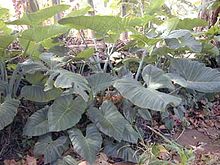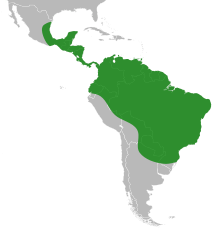| Xanthosoma | |
|---|---|

| |
| Xanthosoma roseum 'Elephant ear' | |
| Scientific classification | |
| Kingdom: | Plantae |
| Clade: | Tracheophytes |
| Clade: | Angiosperms |
| Clade: | Monocots |
| Order: | Alismatales |
| Family: | Araceae |
| Subfamily: | Aroideae |
| Tribe: | Caladieae |
| Genus: | Xanthosoma Schott[1] |

| |
| Range of the genus Xanthosoma | |
| Synonyms[2] | |
| |
Xanthosoma is a genus of flowering plants in the arum family, Araceae. The genus is native to tropical America but widely cultivated and naturalized in other tropical regions.[2] Several are grown for their starchy corms, an important food staple of tropical regions, known variously as malanga, otoy, otoe, cocoyam (or new cocoyam), tannia, tannier, yautía, macabo, ocumo, macal, taioba, dasheen, quequisque, ʻape and (in Papua New Guinea) as Singapore taro (taro kongkong). Many other species, including especially Xanthosoma roseum, are used as ornamental plants; in popular horticultural literature these species may be known as ‘ape due to resemblance to the true Polynesian ʻape, Alocasia macrorrhizos, or as elephant ear from visual resemblance of the leaf to an elephant's ear. Sometimes the latter name is also applied to members in the closely related genera Caladium, Colocasia (taro), and Alocasia.
The leaves of most Xanthosoma species are 40–200 centimetres (16–79 inches) long, sagittate (arrowhead-shaped) or subdivided into three or as many as 18 segments. Unlike the leaves of Colocasia, those of Xanthosoma are usually not peltate- the upper v-notch extends into the point of attachment of the leaf petiole to the blade.
- ^ "Genus: Xanthosoma Schott". Germplasm Resources Information Network. United States Department of Agriculture. 2003-07-09. Retrieved 2012-07-13.
- ^ a b Kew World Checklist of Selected Plant Families